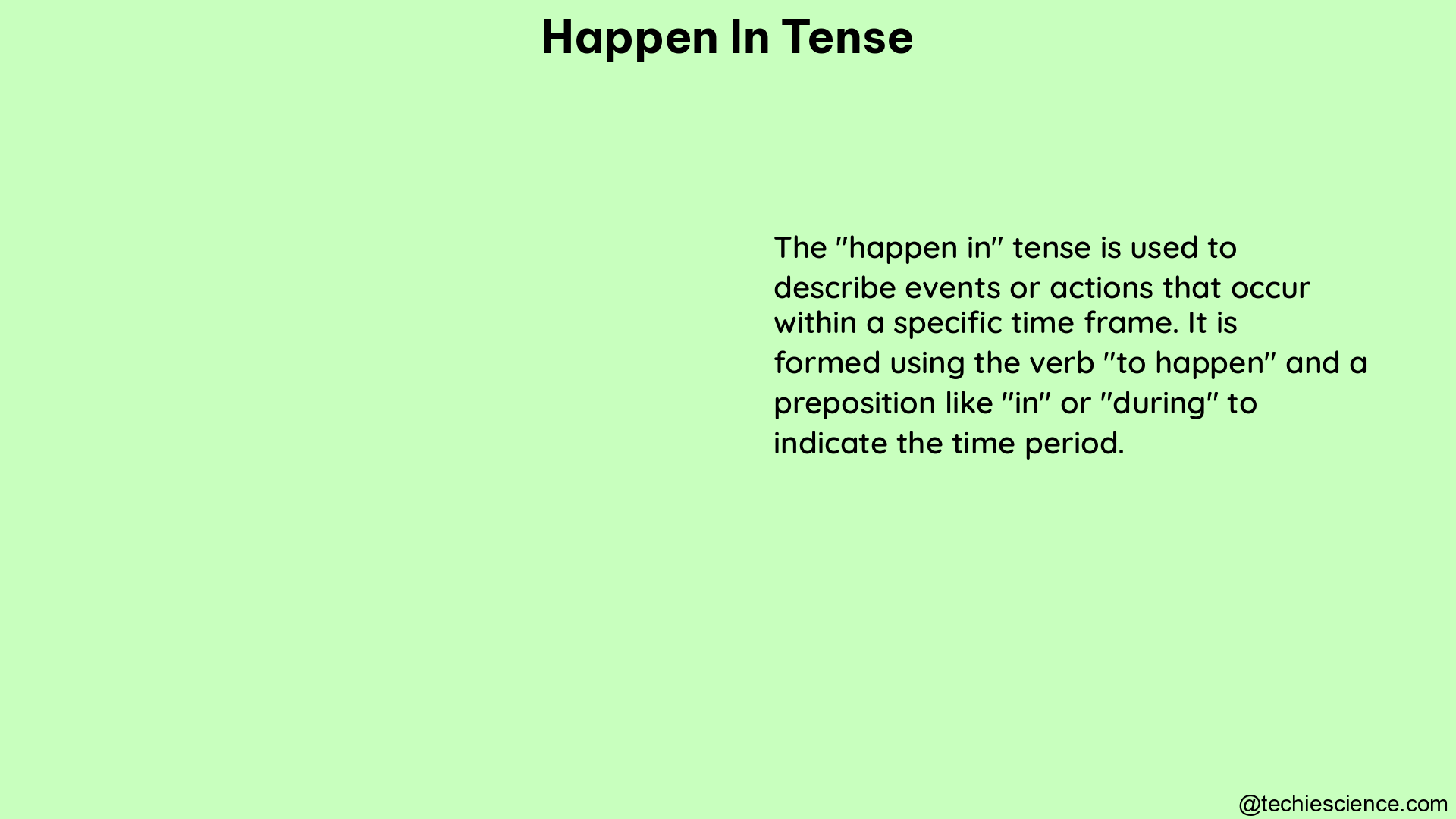The verb “happen” is a commonly used word in the English language, and its conjugation follows a specific pattern across various tenses. This comprehensive guide will delve into the intricate details of how the verb “happen” is used in different tenses, providing a thorough understanding for English language learners and enthusiasts.
Indicative Tenses
Present Simple
- I happen
- You happen
- He/She/It happens
- We happen
- You happen
- They happen
The present simple tense is used to express habitual or regular actions, as well as general truths. For example, “It happens every year” or “I happen to be free tonight.”
Present Continuous
- I am happening
- You are happening
- He/She/It is happening
- We are happening
- You are happening
- They are happening
The present continuous tense is used to describe an ongoing action or event that is happening at the moment of speaking. For instance, “The unexpected event is happening right now.”
Past Simple
- I happened
- You happened
- He/She/It happened
- We happened
- You happened
- They happened
The past simple tense is used to describe a completed action or event that occurred in the past. For example, “I happened to be in the right place at the right time” or “The accident happened last night.”
Past Continuous
- I was happening
- You were happening
- He/She/It was happening
- We were happening
- You were happening
- They were happening
The past continuous tense is used to describe an ongoing action or event that was happening at a specific time in the past. For instance, “The unexpected event was happening while I was away.”
Present Perfect
- I have happened
- You have happened
- He/She/It has happened
- We have happened
- You have happened
- They have happened
The present perfect tense is used to describe an action or event that has occurred at some point in the past, with a connection to the present. For example, “I have happened to meet him before” or “It has happened several times.”
Present Perfect Continuous
- I have been happening
- You have been happening
- He/She/It has been happening
- We have been happening
- You have been happening
- They have been happening
The present perfect continuous tense is used to describe an ongoing action or event that has been happening over a period of time and is still continuing. For instance, “I have been happening to work on this project for the past few weeks.”
Past Perfect
- I had happened
- You had happened
- He/She/It had happened
- We had happened
- You had happened
- They had happened
The past perfect tense is used to describe an action or event that had occurred before another past action or event. For example, “I had happened to find my lost ring before the party started.”
Past Perfect Continuous
- I had been happening
- You had been happening
- He/She/It had been happening
- We had been happening
- You had been happening
- They had been happening
The past perfect continuous tense is used to describe an ongoing action or event that had been happening over a period of time before another past action or event. For instance, “I had been happening to work on this project for a few weeks before the deadline.”
Future Tenses

Future Simple
- I will happen
- You will happen
- He/She/It will happen
- We will happen
- You will happen
- They will happen
The future simple tense is used to express a prediction or a planned future action. For example, “I will happen to be there” or “It will happen again.”
Future Continuous
- I will be happening
- You will be happening
- He/She/It will be happening
- We will be happening
- You will be happening
- They will be happening
The future continuous tense is used to describe an ongoing action or event that will be happening at a specific time in the future. For instance, “I will be happening to work on this project next week.”
Future Perfect
- I will have happened
- You will have happened
- He/She/It will have happened
- We will have happened
- You will have happened
- They will have happened
The future perfect tense is used to describe an action or event that will have occurred before a specific time in the future. For example, “I will have happened to meet him before the party.”
Future Perfect Continuous
- I will have been happening
- You will have been happening
- He/She/It will have been happening
- We will have been happening
- You will have been happening
- They will have been happening
The future perfect continuous tense is used to describe an ongoing action or event that will have been happening over a period of time before a specific time in the future. For instance, “I will have been happening to work on this project for a few weeks by the time the deadline arrives.”
Conditional Tenses
Conditional Simple
- I would happen
- You would happen
- He/She/It would happen
- We would happen
- You would happen
- They would happen
The conditional simple tense is used to express a hypothetical or imagined situation. For example, “I would happen to be there if I could.”
Conditional Continuous
- I would be happening
- You would be happening
- He/She/It would be happening
- We would be happening
- You would be happening
- They would be happening
The conditional continuous tense is used to describe an ongoing hypothetical or imagined action or event. For instance, “I would be happening to work on this project if I had more time.”
Conditional Perfect
- I would have happened
- You would have happened
- He/She/It would have happened
- We would have happened
- You would have happened
- They would have happened
The conditional perfect tense is used to express a hypothetical or imagined past action or event. For example, “I would have happened to meet him if I had attended the party.”
Conditional Perfect Continuous
- I would have been happening
- You would have been happening
- He/She/It would have been happening
- We would have been happening
- You would have been happening
- They would have been happening
The conditional perfect continuous tense is used to describe a hypothetical or imagined ongoing action or event in the past. For instance, “I would have been happening to work on this project if I had more time.”
Imperative
Imperative
- Happen
- Let’s happen
The imperative mood is used to give commands or instructions. For example, “Happen to be there on time” or “Let’s happen to celebrate the occasion.”
Infinitive
Infinitive
- To happen
The infinitive form of the verb “happen” is “to happen.” This form is used in various contexts, such as “I want to happen to be there” or “It’s important to happen on time.”
Participle
Present Participle
- Happening
The present participle form of the verb “happen” is “happening.” This form is used in continuous tenses, such as “I am happening to work on this project” or “The unexpected event is happening right now.”
Past Participle
- Happened
The past participle form of the verb “happen” is “happened.” This form is used in perfect tenses, such as “I have happened to meet him before” or “The accident has happened several times.”
Examples
Present Simple
- “I happen to be there.” (meaning it is a coincidence)
- “It happens every year.” (meaning it is a regular occurrence)
Past Simple
- “I happened to find my lost ring.” (meaning it was a coincidence)
- “It happened again!” (meaning it occurred again)
Present Perfect
- “I have happened to meet him before.” (meaning it was a coincidence)
- “It has happened several times.” (meaning it has occurred multiple times)
Future Simple
- “I will happen to be there.” (meaning it will be a coincidence)
- “It will happen again.” (meaning it will occur again)
References
- WordReference.com – Conjugation of happen
- The Conjugator – English verb conjugation TO HAPPEN
- Gymglish – To happen – English Verb Conjugation
- Simple English Wiktionary – happened
- Writing English – Happen

Hi…. I am Goutam Datta. I have completed a double M. A. in English and B. Ed. I am a creative writer. Currently, I am a part of the LambdaGeeks.